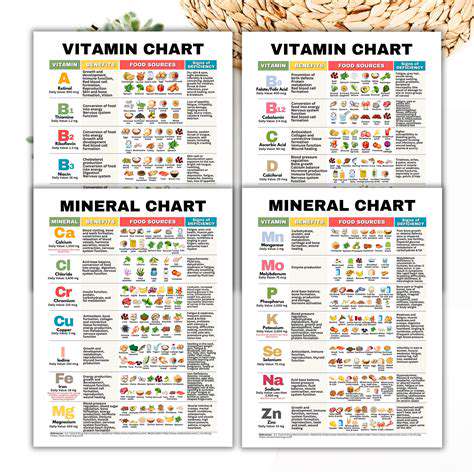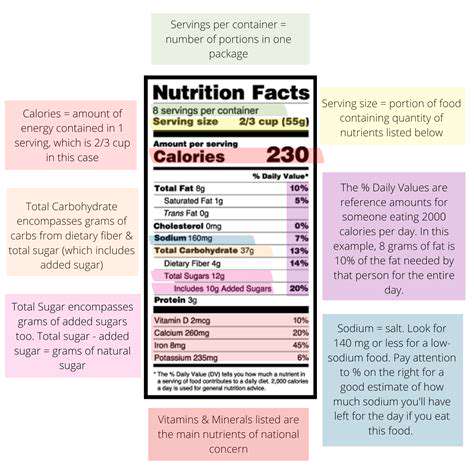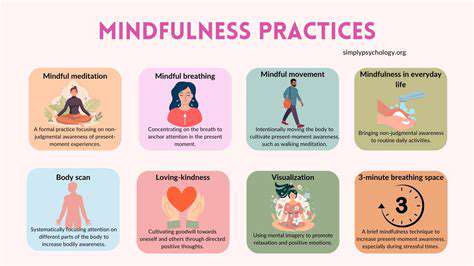Decoding Nutrient Labels: What to Look For

Understanding Caloric Needs
Calories are the fundamental units of energy that fuel our bodies. Understanding your individual caloric needs is crucial for maintaining a healthy weight and achieving your fitness goals. Factors like age, activity level, and metabolism all play a significant role in determining how many calories your body needs to function optimally. A balanced diet, combined with regular exercise, can help you achieve and maintain a healthy weight.
Various online calculators and dietary resources can help you estimate your daily caloric requirements. However, consulting with a registered dietitian or nutritionist can provide personalized guidance tailored to your specific needs and circumstances. This personalized approach can be invaluable for ensuring you're consuming the right amount of calories to support your health and well-being.
The Importance of Total Fat
Total fat, a crucial macronutrient, plays a vital role in various bodily functions, including hormone production, cell growth, and nutrient absorption. However, not all fats are created equal. Understanding the difference between healthy and unhealthy fats is essential for maintaining a balanced diet.
Consuming excessive amounts of unhealthy fats can negatively impact your health, increasing the risk of cardiovascular diseases and other health problems. A balanced intake of both healthy and unsaturated fats is essential for optimal health.
Types of Fats: Saturated and Unsaturated
Fats are categorized into saturated and unsaturated types. Saturated fats are typically solid at room temperature and are often found in animal products like red meat and dairy. Unsaturated fats, on the other hand, are liquid at room temperature and are often found in plant-based foods like avocados and nuts.
Unsaturated fats are generally considered healthier than saturated fats, as they can help lower LDL (bad) cholesterol levels. Choosing sources of healthy fats is crucial for maintaining a balanced diet and improving overall cardiovascular health.
Calorie Density and Fat Content
Different foods have varying calorie and fat densities. Understanding this is key to making informed dietary choices. For example, some high-calorie foods may contain a significant amount of fat, while others may be lower in both calories and fat.
Paying close attention to food labels and nutritional information can help you make informed decisions about portion sizes and overall intake.
Digestion and Fat Metabolism
Your body's digestive system plays a critical role in processing and metabolizing both calories and fat. The efficiency of this process can vary depending on individual factors, such as gut health and overall metabolic function.
Tracking Your Intake
Tracking your calorie and fat intake can be a valuable tool for managing your health and weight. There are many apps and tools available to help you monitor your consumption. Regular tracking can help you identify patterns in your eating habits, allowing you to make adjustments and achieve your health goals.
Keeping a detailed food diary can provide insights into areas where you might need to make dietary changes, such as reducing portion sizes or choosing healthier alternatives.
The Role of Macronutrients
Calories and fat are just two components of a broader picture of macronutrient balance. Protein and carbohydrates also play crucial roles in providing energy and supporting various bodily functions. A balanced intake of all three macronutrients is essential for optimal health and well-being.
Understanding the interplay between these macronutrients is crucial for creating a personalized dietary plan that meets your specific needs and goals.
Protein Powerhouses and Carbohydrate Counts: Essential Macronutrients
Understanding Protein's Crucial Role
Protein, a fundamental macronutrient, plays a vital role in building and repairing tissues throughout the body. It's essential for muscle growth and maintenance, hormone production, and supporting various bodily functions. From repairing damaged cells to transporting vital nutrients, the importance of protein in maintaining overall health cannot be overstated. Understanding the various sources of protein, such as lean meats, poultry, fish, beans, and lentils, is key to incorporating it effectively into your diet.
Protein's presence in every cell and its role in enzyme function highlight its importance in numerous metabolic processes. A balanced intake of protein is crucial for supporting healthy aging and maintaining a strong immune system, as protein is involved in the production of antibodies. The body needs adequate protein for optimal function, and deficiencies can lead to various health problems.
Delving into Carbohydrate Consumption
Carbohydrates are another essential macronutrient providing the body with the energy it needs to function optimally. They are broken down into glucose, which is utilized by cells for energy. Different types of carbohydrates have varying effects on blood sugar levels, with complex carbohydrates generally providing sustained energy compared to simple sugars.
Understanding the different types of carbohydrates, such as whole grains, fruits, and vegetables, is crucial for a balanced diet. Choosing complex carbohydrates over refined sugars is key to maintaining stable blood sugar levels and preventing energy crashes. A balanced intake of carbohydrates, coupled with adequate protein and healthy fats, forms the foundation of a nutritious diet.
Protein Sources and Their Nutritional Value
Various protein sources offer different nutritional profiles. Lean meats, poultry, and fish provide high-quality protein, along with essential vitamins and minerals. Plant-based protein sources, such as legumes and tofu, offer alternative options, often rich in fiber and other beneficial nutrients. Understanding the nutritional composition of different protein sources is essential for creating a balanced and varied diet.
Each protein source has its own unique amino acid profile. This profile determines the protein's effectiveness in supporting various bodily functions. For optimal health, it is beneficial to consume a variety of protein sources to ensure a comprehensive intake of essential amino acids.
Carbohydrate Types and Their Impact on Health
Different types of carbohydrates have varying effects on blood sugar levels and energy release. Complex carbohydrates, found in whole grains, fruits, and vegetables, are broken down more slowly, leading to a gradual release of glucose into the bloodstream. This sustained energy release is crucial for maintaining stable blood sugar levels and preventing energy crashes.
Simple carbohydrates, found in processed foods and sugary drinks, are broken down quickly, leading to a rapid spike in blood sugar. While providing a quick energy boost, this can result in energy crashes and contribute to health problems over time. Choosing complex carbohydrates over simple sugars is crucial for maintaining overall health and well-being.
The Importance of Macronutrient Balance
Maintaining a balanced intake of protein and carbohydrates, alongside healthy fats, is crucial for optimal health and well-being. A diet that prioritizes whole, unprocessed foods, rich in both protein and complex carbohydrates, supports various bodily functions, including muscle growth, energy production, and overall health maintenance. Understanding the role of each macronutrient in the body is essential for creating a personalized nutrition plan.
This balanced approach ensures adequate energy levels throughout the day, supports healthy weight management, and contributes to the overall well-being of the individual. A balanced diet is essential for supporting physical and mental health and promoting longevity.
The Role of Macronutrients in Weight Management
Protein, carbohydrates, and healthy fats each play a unique role in weight management strategies. Protein, due to its satiating effect, can help regulate appetite and reduce overall calorie intake. Carbohydrates, when consumed in balanced amounts and primarily from complex sources, provide sustained energy and support overall health. Healthy fats, when consumed in moderation, contribute to hormone regulation and overall metabolic function. Understanding these roles is key to developing a sustainable weight management strategy.
A balanced approach that considers the specific needs of each individual, taking into account factors such as activity level and health conditions, is paramount for successful weight management. Consulting with a registered dietitian or healthcare professional can provide personalized guidance on creating a balanced and effective diet plan for weight management goals.
Paint scratches can range from minor imperfections to significant damage, each requiring a different approach to repair. A light scratch may simply need a touch-up using a matching paint color to blend in the imperfection. These repairs can be done with minimal tools and time, allowing you to address the damage quickly and efficiently. Often, these minor scratches are subtle and can be corrected with a touch-up pen or a matching paint for an almost invisible repair.
Vitamins, Minerals, and Fiber: Essential Micronutrients

Vitamins for Overall Health
Vitamins are essential organic compounds that the body needs in small amounts to function properly. They play crucial roles in various bodily processes, from supporting immune function to promoting healthy vision. A balanced diet rich in fruits, vegetables, and whole grains is key to obtaining the necessary vitamins. Deficiencies in certain vitamins can lead to a range of health problems, highlighting their importance in maintaining overall well-being and preventing diseases.
Several vitamins are crucial for supporting energy production, promoting healthy cell growth, and maintaining a strong immune system. Consuming a variety of nutrient-rich foods ensures that you are getting a wide spectrum of these essential vitamins, promoting optimal health.
Minerals for Bone Health and More
Minerals are inorganic elements that are vital for many bodily functions. They are involved in maintaining healthy bones, teeth, and blood. Minerals like calcium and phosphorus are essential for strong bones and teeth, while iron is critical for red blood cell production. A deficiency in these essential minerals can lead to various health problems, emphasizing the importance of a balanced diet to ensure adequate intake.
Maintaining proper mineral balance is crucial for overall health. Different minerals have specific roles in bodily processes. For example, potassium plays a key role in regulating fluid balance, and magnesium is involved in muscle function and nerve transmission. A well-rounded diet that includes a variety of foods rich in minerals is essential for optimal health and well-being.
Fiber for Digestive Health and Beyond
Dietary fiber is an essential component of a healthy diet, providing numerous benefits for digestive health. It promotes regular bowel movements, helps regulate blood sugar levels, and contributes to feelings of fullness. Fiber-rich foods like fruits, vegetables, and whole grains are important for maintaining a healthy digestive system.
Fiber also plays a crucial role in maintaining healthy cholesterol levels and promoting satiety. Including sufficient fiber in your diet can contribute to weight management and overall health. By incorporating fiber-rich foods into your daily meals, you can support a healthy gut microbiome and improve digestive function.
Importance of Balanced Intake
A balanced intake of vitamins, minerals, and fiber is crucial for maintaining optimal health. The body needs all of these nutrients working together to perform various bodily functions efficiently. A lack of any one nutrient can disrupt the delicate balance needed for overall well-being.
It's essential to consume a diverse range of foods to ensure a balanced intake of vitamins, minerals, and fiber. Prioritizing whole, unprocessed foods over highly processed options is recommended for a healthier nutritional profile. Consulting with a healthcare professional or registered dietitian can offer personalized guidance on meeting your individual nutritional needs.
Potential Risks of Deficiencies
Insufficient intake of vitamins, minerals, and fiber can lead to various health complications. Deficiencies can manifest in diverse ways, impacting different bodily functions and overall well-being. For example, vitamin D deficiency can lead to weakened bones, while iron deficiency can result in anemia.
Recognizing the signs and symptoms of deficiencies is vital for prompt intervention. Consulting with a healthcare professional is essential for proper diagnosis and personalized treatment plans. Understanding the importance of a balanced diet and the potential risks associated with deficiencies can contribute to informed dietary choices and overall health.












